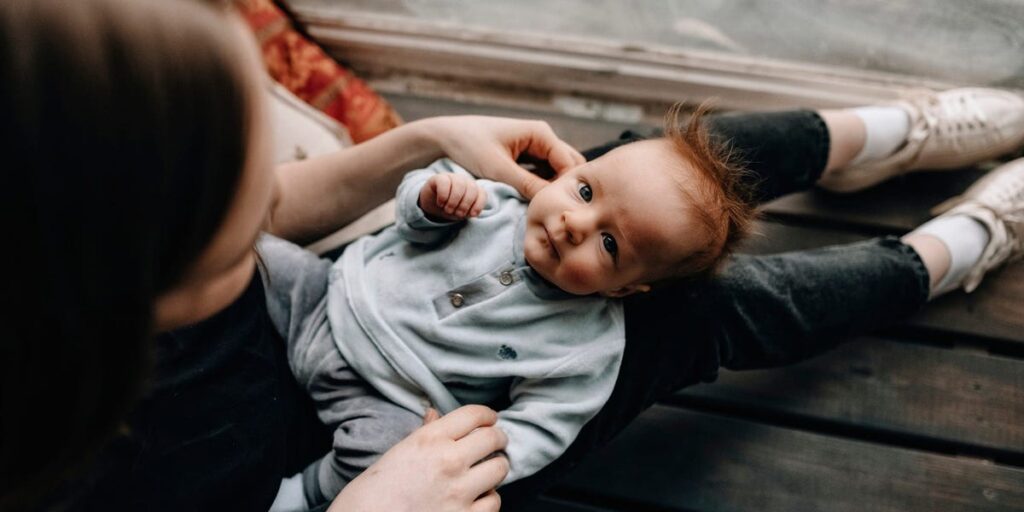- I was 24 when I had my first child and was a personal trainer.
- My partner went back to work a few days after our baby was born, and I did the same after a few weeks.
- I kept asking myself why I was so tired and why everything hurt because I had no idea.
I was 24 when I had my first baby. At the time, I was working for myself as a personal trainer. I saw clients in a small exercise room in my home.
My partner went back to work a few days after I gave birth. And, regardless of the giant chain of stitches from an episiotomy and the fact that sitting down made me yelp in pain and walking felt agonizing, I started training clients five weeks after having my daughter.
We needed the money
As a young couple who had only just been starting out in their careers, of course, we needed the money. Still, I was in pain, and just taking care of a baby single-handedly all day was overwhelming.
I already had an immense amount on my plate, but no one ever seemed to mention that. Friends and family stopped by every once in a while and fawned over the baby. It was 2010, and I don’t remember anyone telling me that postpartum might be challenging or, to put it more accurately, brutal.
Instead, I felt floored by the post-birth pains I felt in my body when I returned to the doctor — twice — to have my stitches checked and the aches in my neck and shoulders from sleepless nights and hunched nursing positions.
Constantly, as I moved through the days, the conversations I had with myself began with the heaviness of it all. “Everything hurts. Why am I so tired? Why is this so hard? What am I supposed to do with a baby all day?” Then, I’d realize that no one was coming to save me. “Everyone does this,” I’d tell myself. “Toughen up. Keep pushing the stroller. Change your shirt. Don’t leave the dishes in the sink. The baby is crying again. You’re a mother. This is all up to you.”
It all felt impossible
So, I kept caring for my daughter all day and working every evening and weekend. Sometimes, during a training session, I’d hear my daughter cry, and my sports bra would become soaked with milk. Sometimes, my partner was late and, embarrassed, I’d hold her through sessions or put her in the doorway in a swing. I was never not multitasking. I was always pulled into 10 places at once.
It all felt impossible, but it never struck me that I should’ve been able to do it differently. As the first person I knew to have a child, my perception of when to go back to work was shaped mostly by the internet. I never heard anyone talking about postpartum or recovery or wading back into life post-birth. It felt like the choices were: return to work at six weeks or don’t at all, and I knew which camp I would be in.
I took more time off with my second child
Four years later, when I had my son, I was terrified of going through postpartum again. And while there is nothing slow about a house with a baby and a 4-year-old, I tried to be gentle with myself and allow myself to feel.
For three months, I catered to my kids and didn’t worry about work at all. I was still exhausted, drained, and struggling, especially since my partner was constantly traveling for work. But I didn’t beat myself up to do more. I had learned that mothering an infant — and doing so single-handedly — is more than enough.
Looking back on it all now, a decade since my second child’s birth, I know that the tasks in front of me — both times — were immense. And I feel sorry for the younger version of myself who didn’t know that at the time. I want to give her a hug, and tell her to go and sit in a park with a coffee, the baby in a stroller, and stare at the sky. I want to tell her that babies don’t get bored, that healing is so important, and that she’s not a horrible mother for needing to rest, to nurture herself, to feel cared for or human.
I don’t yearn for a do-over, but I do regret how hard I was on myself at the time. I wish I had known that after a baby, there is no “returning to normal.” Just painfully slow days and exhaustingly fast ones, at first, and learning to ride the waves. None of the feelings that come with it are wrong. And you’re allowed to feel it all.
Read the full article here
















